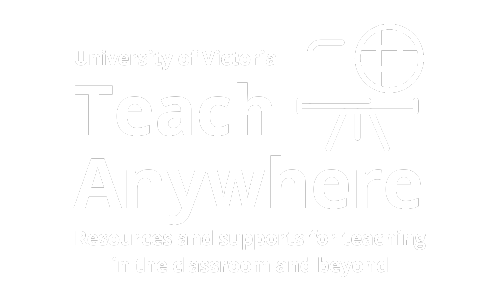The list below represents what a group of experienced UVic Teaching Assistants (TAs) have identified as key considerations before the first class. Not all suggestions below may be applicable in all departments on campus. Please use the list as a guide only as this list is not exhaustive but encompasses a diverse array of aspects.
First impressions
The first meeting of a class is an important vehicle to establish your role as a TA beyond merely sharing information. It is also critical for calling attention to the structure and content of the course.
Pre-class jitters
Practice what you are going to say before the first class. Nervousness may result in accelerated speech and disorganization so make a conscious effort to speak at a moderate pace and maintain your focus.
Remember that you know more about the subject than students so do not doubt your abilities. Stay humble and remember we are all learning together all the time.
Your grand entrance!
- Introduce yourself and the course you are teaching.
- Start with a Territory Acknowledgement, using the resources found here.
- Remind students: your job is to assist them and that you are available for consultation if they are having problems. You are there to aid the success of students.
- Students may not have met a TA before so you may want to explain your role and what parts of the course and for which grades you are responsible, if applicable.
- Mention why you are teaching the course and/or why you are interested in that field of study to break the ice and convey your enthusiasm for the subject.
Other first class activities
- Pass out the syllabus and go over the highlights with the students. Have more copies of the syllabus than you have students, as you may have transfers or waitlisted students arrive. Ensure you have a digital copy that is available to everyone as well on the Brightspace or another online course page. This is the appropriate time to state university guidelines regarding inclusive language, registration, late policies, and department policy towards cheating and plagiarism. This is required to be discussed as well as be clearly written on the syllabus and/or course website. Ensure that all students fully understand these important academic issues and integrity policies.
- Explain what your goals and expectations are and what you expect from students.
- Detail the course requirements and how the grades will be calculated.
- Emphasize that your job is to assist them and that you are available for consultation if they are having problems.
Confirming the register
- Go over your class list in advance to practice pronunciations of student names. Optional: Message the class prior to the first day to ask about pronouns/chosen names versus given names on register (do not assume the UVic list correctly reflects your students’ preferences).
- Check the names on your class list at the start of your first class. Think of a fun icebreaker or community building activity to help learn the names rather than just doing roll call. This can help create a positive learning environment.
- Add new names and delete those who are transferring out of your section and make sure that new students have registered properly with the administration, if applicable.
Creating a learning atmosphere
There is a strong correlation between positive association of the TA and student perceptions that the TA cares about them as individuals.
- Therefore, show students from the very beginning that you view them as individuals and care about them as people.
- The first and one of the easiest ways to accomplish this is to learn their names as quickly as possible. Try repeating their names and using specific information about students to help you remember their names.
Give them a taste of the course
Provide an overview of the course – it can help students decide quickly if they are in the right place. It lets students know that you take the course seriously and that your class will be about learning the course material.
After the first class
- Finish on time so students will not be late for their next class.
- Be available for questions; however, do not linger in the classroom as another class may be waiting.
Reflect on the Class
- Were students actively engaged?
- Did you get your points across? How do you know? What can you do to improve this class next time you teach it?
- What do you need to prepare for next class?
- It might be helpful to consult your fellow TAs or your TAC (Teaching Assistant Consultant) to discuss your first class and observations you made.
- Document one positive thing that happened in your first class.
This guide was developed during the Teaching Assistant Consultants’ (TACs) seminars for the academic year 2009-2010 and updated in 2020-2021.
